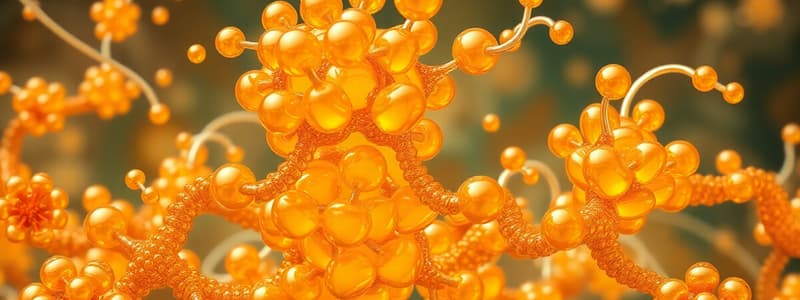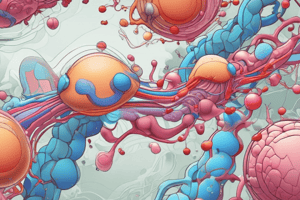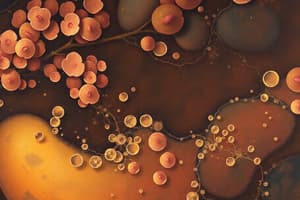Podcast
Questions and Answers
What type of molecules are waxes primarily composed of?
What type of molecules are waxes primarily composed of?
- Esters of fatty acids and alcohols (correct)
- Phospholipids and steroids
- Triglycerides and fatty acids
- Glycerol and amino acids
What is a key characteristic of the fatty acids found in most waxes?
What is a key characteristic of the fatty acids found in most waxes?
- They are aromatic compounds
- They are usually saturated (correct)
- They contain a high number of double bonds
- They are usually polyunsaturated
Which type of lipids are considered the major component of animal biological membranes?
Which type of lipids are considered the major component of animal biological membranes?
- Triglycerides
- Waxes
- Glycerophospholipids (correct)
- Fatty acyl chains
What aspect of glycerophospholipids makes them amphipilic molecules?
What aspect of glycerophospholipids makes them amphipilic molecules?
Which of the following statements about waxes is incorrect?
Which of the following statements about waxes is incorrect?
What is the primary role of thromboxanes?
What is the primary role of thromboxanes?
What structural feature is common to all steroids?
What structural feature is common to all steroids?
How does cholesterol contribute to the plasma membrane of animal cells?
How does cholesterol contribute to the plasma membrane of animal cells?
What type of drugs can affect the action of eicosanoids?
What type of drugs can affect the action of eicosanoids?
What is the significance of the amphipathic nature of cholesterol?
What is the significance of the amphipathic nature of cholesterol?
Which of the following describes the basic building blocks of terpenes?
Which of the following describes the basic building blocks of terpenes?
What is the primary precursor of all animal steroids?
What is the primary precursor of all animal steroids?
What is one of the functions of thromboxanes in the body?
What is one of the functions of thromboxanes in the body?
What is the primary lipid component found in chloroplasts of plant cells?
What is the primary lipid component found in chloroplasts of plant cells?
Which type of lipid functions as a paracrine hormone?
Which type of lipid functions as a paracrine hormone?
What are the main mediators of eicosanoids?
What are the main mediators of eicosanoids?
Which of the following is a function of eicosanoids?
Which of the following is a function of eicosanoids?
What is the chemical structure characteristic of Prostaglandins?
What is the chemical structure characteristic of Prostaglandins?
From which fatty acid are eicosanoids derived?
From which fatty acid are eicosanoids derived?
Leukotrienes are primarily produced by which type of cells?
Leukotrienes are primarily produced by which type of cells?
Which of the following functions is NOT associated with eicosanoids?
Which of the following functions is NOT associated with eicosanoids?
Which of the following lipid types is classified under signalling lipids?
Which of the following lipid types is classified under signalling lipids?
Galactolipids are synonymous with which term?
Galactolipids are synonymous with which term?
What are triacylglycerols commonly known as?
What are triacylglycerols commonly known as?
Which component is esterified to three fatty acid residues in triacylglycerols?
Which component is esterified to three fatty acid residues in triacylglycerols?
What is the main purpose of triacylglycerols in animals?
What is the main purpose of triacylglycerols in animals?
What is the process called when unsaturated fatty acids are converted to saturated fatty acids using hydrogen gas?
What is the process called when unsaturated fatty acids are converted to saturated fatty acids using hydrogen gas?
Which reaction involves the formation of soap from fats or oils?
Which reaction involves the formation of soap from fats or oils?
What type of lipid are triacylglycerols categorized as?
What type of lipid are triacylglycerols categorized as?
What is produced during the hydrolysis reaction of fats or oils in saponification?
What is produced during the hydrolysis reaction of fats or oils in saponification?
In industrial processing, what is typically used as a catalyst for the hydrogenation of oils?
In industrial processing, what is typically used as a catalyst for the hydrogenation of oils?
What do glycerophospholipids primarily have as their parent compound?
What do glycerophospholipids primarily have as their parent compound?
Which of the following correctly describes the nature of glycerophospholipids?
Which of the following correctly describes the nature of glycerophospholipids?
Which molecule is NOT a derivative of phosphatidic acid?
Which molecule is NOT a derivative of phosphatidic acid?
Which of the following compounds is categorized under sphingolipids?
Which of the following compounds is categorized under sphingolipids?
What is the role of the polar 'head' groups in glycerophospholipids?
What is the role of the polar 'head' groups in glycerophospholipids?
Which of the following best describes the term 'amphipilic'?
Which of the following best describes the term 'amphipilic'?
Identify the component that distinguishes sphingolipids from glycerophospholipids.
Identify the component that distinguishes sphingolipids from glycerophospholipids.
Which glycerophospholipid is derived from choline?
Which glycerophospholipid is derived from choline?
Flashcards are hidden until you start studying
Study Notes
Storage Lipids
- Triacylglycerols are also known as triglycerides or fats.
- They are the most abundant class of lipids and serve as energy stores in animals, specifically in adipocytes.
- Triacylglycerols consist of a glycerol molecule esterified to three fatty acid residues.
- There are two types: simple triacylglycerols (all three fatty acids are the same) and mixed triacylglycerols (at least two different fatty acids).
Reactions of Triacylglycerols
- Hydrogenation:
- The reduction of double bonds in unsaturated fatty acids to convert them into solid, saturated fatty acids.
- This process uses hydrogen gas and a catalyst (Pt or Pd).
- Saponification:
- The process of making soap from fats or oils.
- It involves reacting fats or oils with a base to form a surfactant (soap) in a hydrolysis reaction.
Waxes
- Esters of fatty acids and alcohols.
- The fatty acids in waxes are usually saturated.
- The alcohols in waxes can be saturated or unsaturated.
- Waxes are highly insoluble in water.
- Examples:
- Lanolin (used as a base for pharmaceutical products)
- Carnauba wax (used as floor and automobile wax)
Structural Lipids
- Major component of cell membranes.
- Two types:
- Phospholipids
- Glycolipids
Phospholipids
- Glycerophospholipids:
- Also called phosphoglycerides.
- The major lipid component of animal biological membranes.
- Amphiphilic molecules (contains both polar and nonpolar parts).
- Have glycerol as their backbone.
- Most glycerophospholipids have phosphatidic acid as the parent compound.
- Derivatives of Phosphatidic Acid:
- Phosphatidylcholine:
- X = choline
- Phosphatidylethanolamine:
- X = ethylamine
- Phosphatidylserine:
- X = serine
- Phosphatidylinositol:
- X = myo-inositol
- Phosphatidylcholine:
- Sphingolipids:
- Class of lipids usually found in biological membranes.
- Have sphingosine as their backbone.
Glycolipids
- Galactolipids:
- Also called sulfolipids
- The major lipid component of plant cell membranes.
- Makes up approximately 70-80% of plant lipids in chloroplasts.
- Gangliosides:
- Found in animal cell membranes, particularly nerve cells.
Signaling Lipids
- Eicosanoids:
- Paracrine hormones derived from arachidonic acid (a 20-carbon polyunsaturated fatty acid).
- Classified into three types:
- Prostaglandins
- Thromboxanes
- Leukotrienes
- Mediators of:
- Inflammation
- Fever and pain
- Progression or termination of pregnancy
- Regulation of blood pressure
- Menstruation
- Steroids:
- A large, terpene-based class of lipids.
- All steroids have a common structural motif consisting of four rings fused together.
- The most common steroid and precursor of all animal steroids is cholesterol.
- Cholesterol is an important component of animal cell plasma membranes and regulates the fluidity of the membrane.
Cholesterol
- Synthesis:
- Synthesized by all animal cells from Acetyl-CoA.
- Function:
- Important component of animal cell plasma membranes.
- Regulates the fluidity of the membrane.
Studying That Suits You
Use AI to generate personalized quizzes and flashcards to suit your learning preferences.




